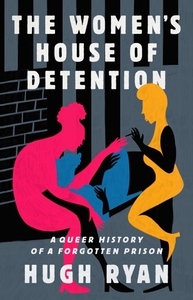Take a photo of a barcode or cover
informative
reflective
medium-paced
Incredibly well researched and compelling text - I would highly recommend!
challenging
dark
emotional
informative
reflective
slow-paced
This is an incredibly thorough, well-researched book about the history of this women's prison and the counter culture that sprang up around it. I loved the stories about the specific inmates, how you got to know them before, during, and after their incarceration. A few stories felt cut off or incomplete without explanation.
This book didn't lend itself to the ebook format considering the large passages that were directly quoted. They weren't offset from the main text, and it took a lot of the book to figure out what they were.
This book is a study of the deliberate dysfunction of the police, especially when it comes to race, sexuality, and mental health.
This book didn't lend itself to the ebook format considering the large passages that were directly quoted. They weren't offset from the main text, and it took a lot of the book to figure out what they were.
This book is a study of the deliberate dysfunction of the police, especially when it comes to race, sexuality, and mental health.
informative
medium-paced
challenging
emotional
informative
reflective
sad
slow-paced
brilliant work of queer women's history, and incarceration, two things that i'm passionate about but had been ignorant to seeing the connection between until reading this.
I chose to read via audiobook and it was very well done. I typically don't read non-fiction but this was super informative. I never realized how much this womens prison shaped our history. A must read.
Read this one for queer book club in Portland! Even as someone pretty familiar with the inadequacies of the American criminal justice system, this was still such a learning opportunity for me. It was interesting to learn more about how being queer, being a PoC, and being a woman (or some combo of the three) has been consistently criminalized depending on public sentiment and moral values.
The book is less "dry" than other prison abolition texts, instead choosing to highlight the untold stories of many women who went through The House of Detention in Greenwich Village.
Would easily recommend to anyone who wants to understand more about the unfairness of our legal system, how history is written with a bias, or just understanding a part of New York and American culture through a less-covered marginalized group, my lesbian sisters and siblings!
The book is less "dry" than other prison abolition texts, instead choosing to highlight the untold stories of many women who went through The House of Detention in Greenwich Village.
Would easily recommend to anyone who wants to understand more about the unfairness of our legal system, how history is written with a bias, or just understanding a part of New York and American culture through a less-covered marginalized group, my lesbian sisters and siblings!
The Women's House of Detention is an exhaustively-researched and richly-detailed history of the eponymous women's prison that once operated in Greenwich Village, but its focus sprawls beyond the walls of the building itself as Ryan explores the lives of the cis women and trans men who passed through it. He argues convincingly that the Women's House of D served as a crucial center of queer culture in the Village, and in the process also makes the importance of prison abolition abundantly clear.
It's as fascinating, harrowing, and infuriating as you likely expect just from the subject matter. It feels very solid from an academic point of view, but Ryan's prose reads well and makes the book fine for slightly heavy pleasure reading. I have a couple of personal quibbles: The book does become a bit repetitive and I found it difficult to keep some of the individuals profiled clear in my mind, and the oft-repeated phrase "women and transmasculine people" stuck in my craw a little the way it always does when people say "women" but mean "cis women."
However, this feels like an important chronicle of queer history, and I do recommend it.
It's as fascinating, harrowing, and infuriating as you likely expect just from the subject matter. It feels very solid from an academic point of view, but Ryan's prose reads well and makes the book fine for slightly heavy pleasure reading. I have a couple of personal quibbles: The book does become a bit repetitive and I found it difficult to keep some of the individuals profiled clear in my mind, and the oft-repeated phrase "women and transmasculine people" stuck in my craw a little the way it always does when people say "women" but mean "cis women."
However, this feels like an important chronicle of queer history, and I do recommend it.
This book is an extremely important read. Ryan’s dedication to giving light to stories that have not been favored by movements that have lacked intersectionality is extremely hopeful. Even in the face of such brutality. A required read for anyone interested in prison abolition and queer histories.




